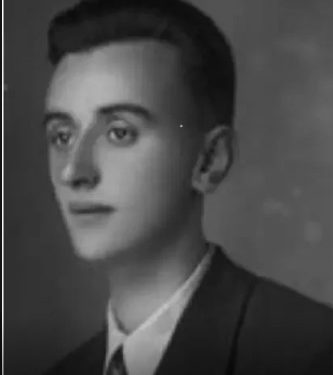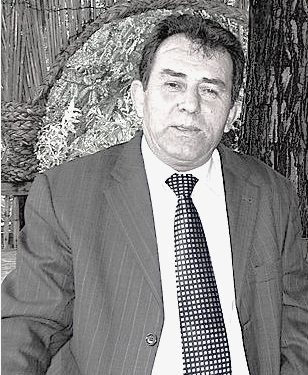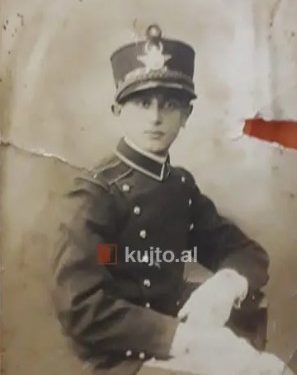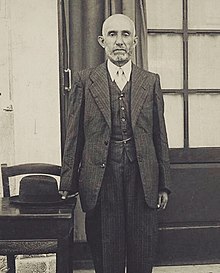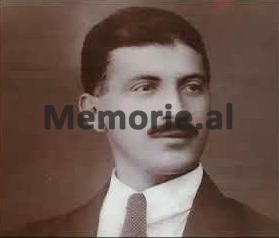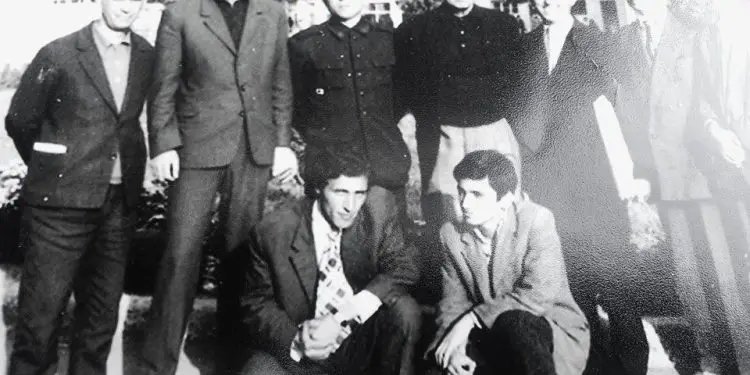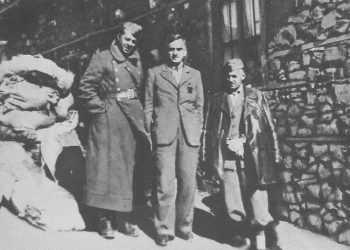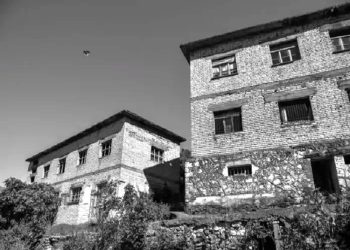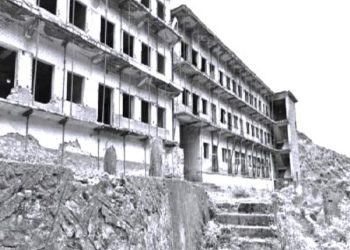Memorie.al /The communist regime, sentencing him three times and leaving him in prison for almost 30 years, destroyed the life of the senior military graduate in Italy, but did not destroy the man, Zef Ashta. Although suffering a long and hopeless imprisonment, Ashta became a hopeful role model for political prisoners. Here we are bringing a profile of him, based on the extraordinary impressions of a former political prisoner, young in age, which met him in prison and never forgot him. Zef Ashta is one of the former political convicts with the longest prison terms in Albania. He was convicted for the first time when he was 33 years old and, since then, the persecution of him has not stopped.
“The officer with the Military Academy, Zef Cin Ashta, born in Shkodër in 1913, was sentenced three times by the communists and died in prison in the 30th year of his sentence. He suffered exactly 29 years, 5 months and 25 days. A life spent in vain and spent with much trouble. “Almost no white day from 1946 until his death in 1979. One of the many stories of educated people who suffered under a regime of ignoramuses,” writes researcher Kastriot Dervishi, in an article dedicated to him.
And yet, as the ex-convict, Shkëlqim Abazi, tells in the book “Spaçi”, published by ISKK, (Institute for the Study of the Crimes of Communism), Zef Ashta was not defeated, but transformed from a career officer into a patriot and minister of nationalism and Albanianism in prison. Abazi, who also had an Italian teacher in Spaç, dedicates a special section to the officer in this book, which we are bringing here with abbreviations.
“When I was going to be transferred to Spaç – writes Abazi – in September 1970, friends recommended me, as one of the people I had to meet, to orient me in the new environment.
He was a petite man of over fifty-five-sixty years old, removed, dry, hunched, far from the identikit of the tall officer. But the soft timbre, delicacy and gentlemanly tact made it interesting.
…He conveyed the virtues of the martyr in exemplary behavior and indomitable character and revealed the Olympian calm of the modern intellectual, with moral fortitude. In that personality, the faith of the idealist, in the best tomorrow, was mixed with the nobility of the pure nationalist, who offered unconditional love to the Motherland even when he became his stepfather.
He was a sincere, kind and self-sacrificing friend without being annoying. A benchmark of modesty, honesty, excellence, intelligence, bravery and a moral pillar, where young people found support.
Although in uncomfortable conditions and in difficulties, the world that many could have given up on, he resisted, revealing the values of Shkodra’s citizenship.
Zephy represented the humble type, with a sea of virtues. In him Christian education was combined with the Spartan way of life, perhaps inculcated by the years of academic studies in Italy, which combined elegance, knowledge and discipline with the word of honor, consolidated during his service in the ranks of the National Army, qualities that were intertwined with coolness and the sense of judgment in unusual situations.
A polyglot par excellence, he mastered ancient and modern Italian, Latin, ancient Greek, French, Spanish.
…With all the erudition, it didn’t get any bigger…!
Although our age, origin, profession, training did not match, I found in his person, the ideal manager.
In him we saw the energetic old man, the dedicated missionary, the person who did not care about localism, on the contrary, he despised the instigators of this phenomenon. Dasas were unacceptable to him, so he built decent relationships, for gentlemen.
We knew him as a “mythist” with free convictions, cold logical understanding with perfect education, broad culture, brilliant intellect, open to the interlocutor, how patiently he listened to any opponent, even giving them space to express themselves without interrupting and he did not object even when they insulted him with banal language, so he was considered an excellent polemicist.
From the beginning I knew him well, but I didn’t hear him complain. Suffering from a collection of ailments, he endured the shattering of bones and the shredding of cavernous lungs with the stoicism of a martyr.
In addition to this, he needed food of a slightly better quality, which he could not provide, because it was six cents permanently; even when they took him out to work, they took him to the maintenance brigade, which in any case did not increase his ration with any extra crumbs.
There was help from the first family, because the sister was struggling to find them, but she was very poor and it was impossible to come to Spaç often, due to the distance and lack of finances, so she had to start them from time to time. , some poor packet and letter, enough to keep him up to date with the latest news. That’s how the cauldron was left…!
As friends, we knew his difficulties and tried to find them, but he refused. Once I wanted to forgive him for something, but I felt bad when he came back to me:
“They share the age of the rich, on occasions of holidays, joys or sorrows, for orphans, widows, the weak, the crippled, the destitute, come on, they are like that, my friend”!
That’s how we really were, but we also invented original methods: we organized a bread table, when our family came and we put the proud ones at the head, like Zefi.
In his youth, he devoted himself to his career and the national cause. Then he was arrested and sentenced, and then again, he was released, but he was arrested again, so he could not start a family. He threw all his love for the missing children to his fellow sufferers.”
Zef Ashta’s conviction file, published by Kastriot Dervishi:
The first sentence
He was arrested on 26.11.1946. The judgment was made together with other personalities who lived in Shkodër such as: Xhemal Naipi, Shaqir Omari, Shefqet Muka, Ismail Muhaj, Bep Negri and Nexhat Boriçi. They were attacked with contradictory accusations, but basically as opponents of the regime. Zef Ashta was sometimes blamed as a soldier and sometimes as a member of the ‘National Front’.
He was accused of training the forces of the “National Front”, which would fight “against the partisans of the Yugoslav people”, based on the articles of law no. 372. He was judged by the Military Court of the Shkodër Military Zone. With the decision dated 23.6.1947, the court declared them guilty and initially sentenced them to death (the prison sentence was returned), while Zef Ashta was sentenced to 10 years and Nexhat Boriçin, 15 years in prison. He was released from prison on 30.8.1951.
The second sentence
Two years after he was released from prison, he was arrested again on 19.3.1953. He was accused under articles 72, 74, 226, of the Criminal Code, that since 1949, when he was serving his sentence, he had talked with other people about the valuable organization for the future, adding to the ranks of the “fascist organization of the National Front”.
The activity was said to have continued even after leaving prison. He was called guilty of listening to foreign western radios, from which he made “war propaganda”.
It was ridiculously accused that this would harm world peace and socialism in general. It was also said that he had received an invitation to run away with a friend, and you had not reported this.
The People’s Court of Shkodra constituted, with decision no. 311, dated 26.8.1953, declared him guilty, based on the above articles, and sentenced him to 14 years of imprisonment. His property was not confiscated, because he had none. He was released on 7.2.1964.
The third sentence, death in Spaç
A few months after his release from the second sentence, Zef Ashta was arrested again, on 28.7.1965. It was accused that together with the former accomplice, Gjeto Rama, they had tried to escape, but were caught by the border forces, at the Muriqani post office.
The court considered that; they were “elements with pronounced micro-bourgeois waste”, who “were bitter against popular power”. Their work was considered “great social danger”, because it “helped the activity of external enemies”.
The constituted Shkodër District Court, with decision no. 30, dated 8.10.1965, declared them guilty, based on Article 64/10 of the Criminal Code, and sentenced them both to 17 years of imprisonment. In 1973, Zef Ashta was asked to be re-sentenced in the Spaçi revolt, but for lack of evidence, he was acquitted. After a few years, he died in this camp, on 5.6.1979. Memorie.al




